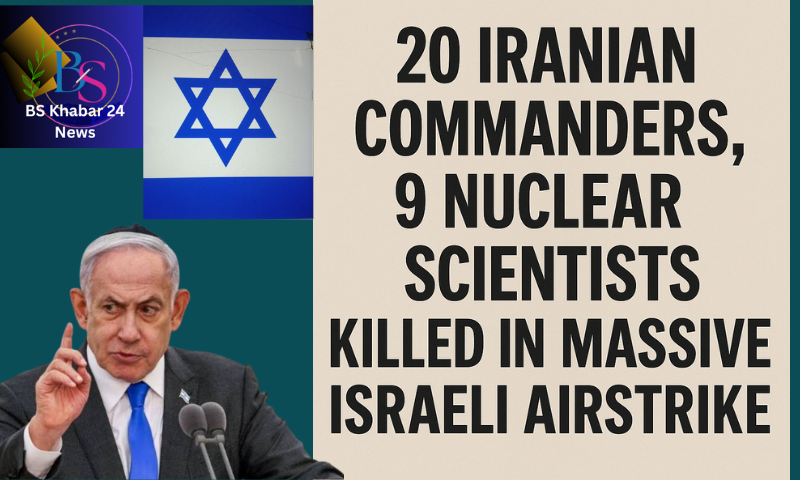Middle East in Turmoil: Netanyahu, 20 Iranian Commanders, and 9 Nuclear Scientists Killed in Devastating Israeli Airstrike
Many dangerous and devastating strikes affected the Middle East, including a strong Israeli bombing that killed nine nuclear experts, 20 top Iranian military leaders, and Israeli Prime Minister Benjamin Netanyahu. Though preliminary indications from regional and international media, as well as anonymous high-ranking military officials, indicate that the already tense Israeli-Iranian war is intensifying, the situation is still stable.
Analysts warn that the extraordinary episode may be a watershed in the Middle East’s modern history, causing nervous around the world.
A Coordinated Assault?
Middle East, According to reports, the airstrike took place early on Monday morning and was directed at “strategic Iranian facilities” and “high-risk operatives” within Iran, according to Israel. But when news broke that Israeli Prime Minister Benjamin Netanyahu had also been killed in what may have been a counterattack on Tel Aviv that was retaliatory or poorly planned, the situation took an unexpected turn. As of this writing, the Israeli Defence Forces (IDF) have not released an official announcement confirming Netanyahu’s death, and conflicting information is still coming to light.
Iranian state media confirmed the deaths of 20 top-ranking commanders from the Islamic Revolutionary Guard Corps (IRGC) and 9 scientists reportedly working on Iran’s nuclear program. The attack hit a facility on the outskirts of Natanz, long known for its role in uranium enrichment and nuclear development. The loss of such high-level figures is a devastating blow to Iran’s defense and strategic capabilities.
The Fallout in Israel
If officially verified, Netanyahu’s purported demise would rock the political scene not only in Israel but also the entire world. Netanyahu, one of Israel’s most divisive leaders and its longest-serving prime minister, has taken a strong stand against Iran and its nuclear aspirations.
Middle East,According to reports, an unidentified missile struck a high-security war bunker close to Tel Aviv while he was there. Security experts are wondering if Iran’s strike was a planned operation to decapitate Israel’s leadership or if it was a retaliatory strike in response to the Natanz attack.
In anticipation of possible ground escalations, Israel has called up reservists and triggered its full military alert system. The country is already grieving and preparing for more war. Israel’s defence establishment and its close allies, especially the United States, are allegedly holding emergency consultations.
Iran’s Heavy Loss
One of the worst single-day strikes against Iran’s military leadership in recent history was the death of 20 senior IRGC commanders. According to reports, these people were in charge of everything from nuclear security and ballistic missile coordination to drone operations.
Three experts involved in Iran’s contentious uranium enrichment program are among the deceased. They were involved in the creation of Iran’s sophisticated centrifuges, according to intelligence insiders, which has raised concerns around the world over whether this will halt or covertly speed up Iran’s nuclear aspirations.
Ayatollah Ali Khamenei, the supreme leader of Iran, declared the strike to be “an act of war” and promised “divine retribution.” Enormous crowds assembled in Mashhad, Qom, and Tehran, chanting anti-Israel slogans and demanding retribution. Iranian military planes are on high alert around the country, and the Iranian parliament has already called an emergency session.
Global Reactions Pour In
Global leaders are reacting warily and anxiously. The White House is “monitoring the situation closely,” according to U.S. President Joe Biden, who also encouraged both countries to “step back from the brink.” China and Russia, meanwhile, have demanded an urgent meeting of the UN Security Council to discuss the escalating tensions.
In a statement, the UN Secretary-General called for de-escalation and cautioned that more aggression might spark a devastating regional conflict.
With oil prices already rising after the attack, NATO nations have also voiced alarm about the potential effects on the world’s energy markets.
What Comes Next?
Netanyahu’s passing, if verified, Middle East, will leave a huge void in Israeli politics. Although temporary measures are probably in place, it is unclear who will assume control of the administration at such a crucial juncture. However, Iran might experience a reorganisation of internal authority, especially in its military leadership.
There is no doubt that the destruction and death toll from this most recent flare-up are not the end. Whether the next chapter in Middle East history is defined by greater violence or diplomacy will be determined in the days and weeks to come.
A Region on the Edge
This event represents not just a military escalation but a deeply symbolic clash between two arch-rivals. The targeting of nuclear personnel and state leadership indicates a dangerous willingness to move beyond red lines that were once thought untouchable.
As the dust settles and investigations continue, the world watches — breath held — hoping that this will not spiral into a full-blown war. But with emotions running high and major leaders lost, peace seems a distant possibility at this critical juncture.
